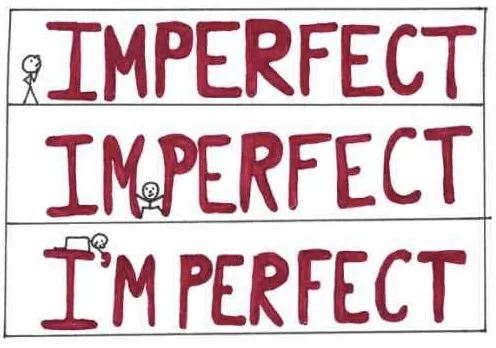
Practice the Commitments and Life Will Be Perfect
The belief of perfection is something that most of us may not notice running in the background of the “operating system” of our lives. I certainly wouldn’t have thought I had any attachment to perfection. I viewed a perfectionist as someone who obsessed over never making a grammatical error in an email and someone who never wore a wrinkled t-shirt. I couldn’t relate to either. I do both regularly.
But then it all came crashing down. Last year I got divorced.
Divorced.
It took me 6 months to be able to say the word out loud. I was a “conscious” leader, a “conscious” person. “Conscious people don’t get divorced” was the scratchy-sounding recording that replayed itself over and over again in my head.
I was a person who talked to hundreds of people about how to create thriving relationships at work and at home. I coached people on the process of communicating with candor and revealing their feelings. I held the unconscious belief that living consciously meant having a perfect life with no discomfort and everyone getting along swimmingly. My passion for living an authentic life and practicing self-awareness turned into a drive for perfection based on fear.
Oftentimes, the devil is in the details. My quest for an idealized life drove me to click on links I know better than to click on and to subscribe to more blog posts than I ever had time to read. I created an idealistic story and plan about how I needed to show up in the world set up with the (unconscious) intention to never encounter an uncomfortable moment in my life ever again.
I skipped over my deepest feelings and silenced my judgments. If I were “perfect” at practicing the commitments, it would be unicorns and rainbows forever. I would have the ideal life of a perfectly conscious person.
Psychologists have written extensively about this phenomena of moving from passion to fanatical perfectionism. Across the board, the consensus is that once we become enamored with perfectionism, we exclude any other points of view. We fixate on one approach and one way of being. My dogmatic perfectionism included the belief that perfectly conscious people don’t get divorced.
The truth is, it’s possible to get divorced from a place of consciousness or from a place of unconsciousness. And people who come from a place of consciousness in many or most areas of their lives encounter difficult times and can make unconscious decisions too. Living consciously is likely best summarized by Socrates; “the unexamined life is not worth living.”
Perfectionism is ironically an easy trap to fall into on the quest to live a conscious life. It stops curiosity in its tracks, leading to living a life based on how things “should” be versus being with what is. Living the commitments without an attachment to perfection inspires curiosity and non-judgment which are essential ingredients for growth and learning. I’ll take those and leave the perfectionism to someone else.









